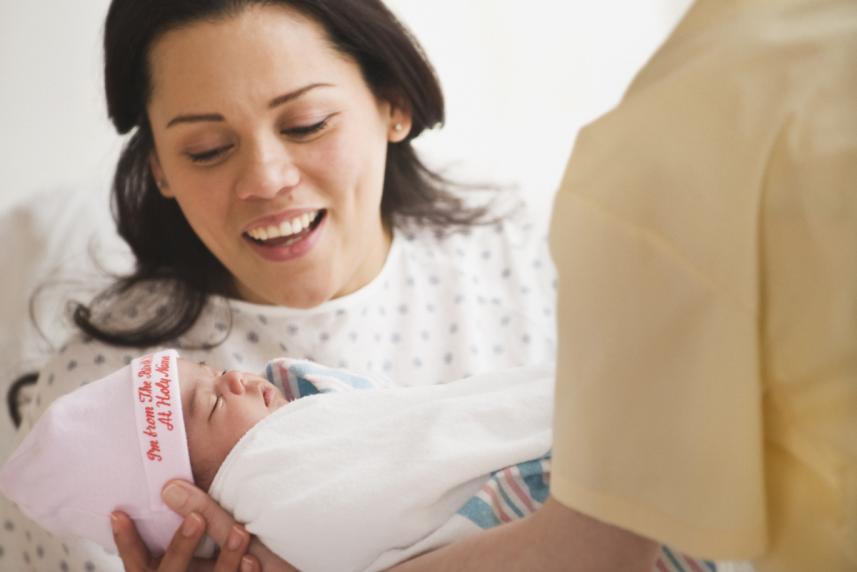What to expect after giving birth
A lot happens to a new mother, physically and emotionally, in the first 24 hours after her baby arrives. Here’s an overview of what to expect.

That tiny person you’ve been carrying around inside you for nine months is finally in your arms! But what happens next? When you’re pregnant, it’s easy to focus on preparing for your bundle of joy and overlook planning for the hours immediately following the delivery. Let’s take a look at the physical and emotional changes you may experience in the first 24 hours.
You’ll Lose Weight
Whether you deliver vaginally or via cesarean section, you can expect to lose about ten pounds right away, which includes the baby’s weight, the placenta, and the amniotic fluid. In the week following your baby’s birth, you’ll also start eliminating other fluid that you retained during the pregnancy, through sweating (including night sweats) and frequent urination. After the delivery, it’s absolutely normal to still have a slight pregnancy bump, because your uterus, abdominal muscles, and skin have been stretched to accommodate the baby.
You’ll Experience Cramps and Bleeding
Pelvic cramps are common. These are known as afterpains, and they generally subside within a few days. This happens because your uterus will be tightening in order to return to its prepregnancy size and location. The pain may be more noticeable when breastfeeding, as breastfeeding triggers the production of the hormone oxytocin, which in turn causes the uterus to contract. Vaginal bleeding and discharge, called lochia, is common as well; you can expect it to clear up within a few weeks of delivery.
You’ll Be Sore
A cesarean section is a major abdominal surgery. Common side effects that may occur include: nausea, low blood pressure, shivering, and back pain. Be aware of any redness, swelling, and oozing around the incision, as those can be signs of an infection.
A vaginal delivery will stretch your perineum (the area between the rectum and vagina) and cause it to swell, bruise, and possibly tear. This may cause discomfort while sitting. Alleviate the pain and swelling with ice packs, by sitting on a pillow or donut ring, or try a sitz bath in a tub of warm water. Use a squirt bottle filled with warm water to keep the perineal area clean.
Your Breasts Will Change
After delivery, your breasts will probably feel soft. They will produce a small amount of colostrum, a thick, yellow, nutrient-rich precursor to breast milk. After about three or four days of producing colostrum, your breasts will begin to make milk, and they may also feel hot and tender. At first, when you feed your baby, your nipples may feel sore. Ask a lactation specialist for assistance with getting your baby to latch on correctly; they can also help you manage any discomfort you’re experiencing.
You’ll Have Mood Swings
Due to hormonal changes, you’ll experience a lot of different emotions. You may experience sadness after having been pregnant for nine months. Or you may feel overwhelmed by the idea of parenting. You’ll most likely be exhausted from the delivery, especially if you were already having a hard time sleeping during the last few weeks of pregnancy. Try discussing your feelings with your partner or a close friend or family member. Be sure to cut yourself some slack too; being a bit short-tempered during the first few weeks of your child’s life is absolutely normal!
Your baby will be having a pretty busy day too.
One minute after birth, your doctor will perform an Apgar test to check your baby’s heart rate, breathing, color, activity, muscle tone, and reflex response. A score of seven or higher is normal. A lower number may indicate a need for medical support like oxygen. Your doctor will repeat the Apgar test five minutes after birth.
Shortly after your baby is born, a nurse will weigh him/her and take measurements, including length, chest circumference, and head circumference. The baby’s hearing will be tested, and an antibiotic eye ointment or drops will be administered to prevent eye infections. A vitamin K shot will be given to assist with blood clotting. You may also choose to start the hepatitis B vaccine series at this point.
Before your baby is discharged, he/she will also need to get a heel-stick test, which is a blood test that checks for certain diseases or deficiencies. Each state has its own list of diseases that this test must screen for, including phenylketonuria, a disorder that causes a buildup of a certain amino acid in the blood. If there are genetic diseases that you’re particularly concerned about, ask your doctor to include those screenings as well.


